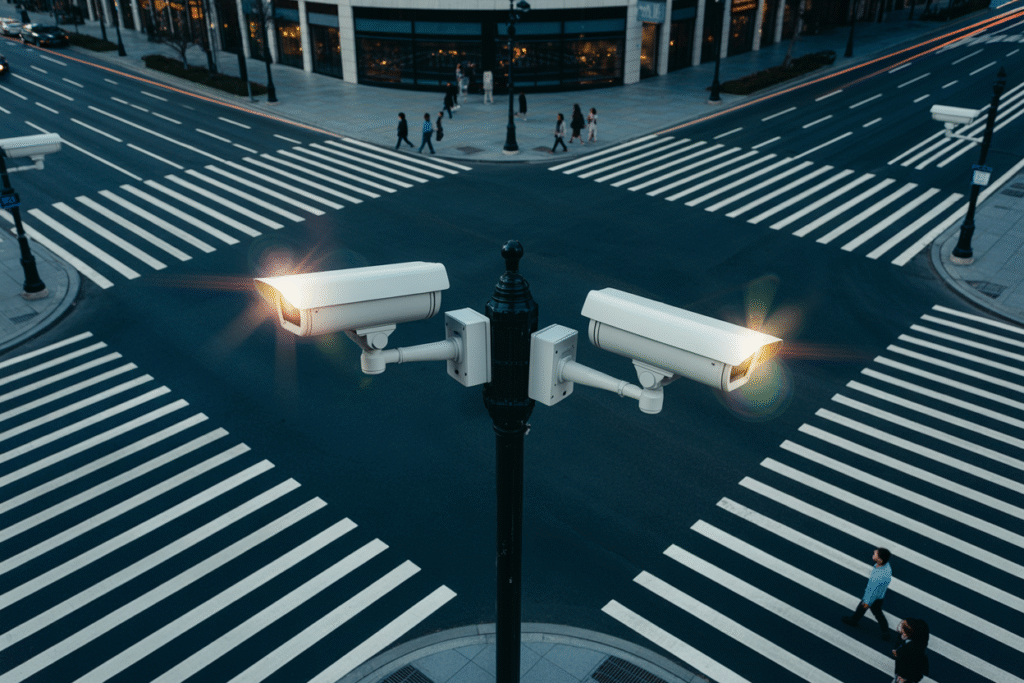AI firms are quietly cashing in on government contracts that turn cities into data goldmines—while citizens wonder who’s really being protected.
Scroll through your feed and you’ll spot the same unsettling meme: a glowing red eye labeled “AI” hovering over a city skyline. It’s funny until you realize the joke is your privacy. Over the past three hours, whistle-blowers, union leaders, and even an ex-influencer have been sounding the alarm on AI surveillance. Their stories are raw, urgent, and packed with keywords like AI surveillance, ethics, and job displacement. Let’s unpack what’s at stake.
The Profit Motive Behind AI Surveillance
Revolutionary Blackout’s viral post shows AI companies signing lucrative deals with federal agencies. The image? A cartoonish overlord counting cash while cameras multiply on streetlights.
Critics argue this isn’t about safety—it’s about revenue. Every license-plate reader and facial-recognition node is a subscription service billed to taxpayers.
Supporters counter that AI surveillance reduces crime. Yet the data is murky. Cities with heavy camera coverage still report mixed results on violent crime rates.
So who pockets the profit? Private contractors, cloud providers, and data-labeling firms. Meanwhile, citizens foot the bill and surrender biometric data in the process.
Labor Unions Draw a Line in the Sand
The Washington Post broke the story: unions in five states are lobbying for hard caps on AI deployment in workplaces. Their rallying cry? “No robots until workers have a seat at the table.”
Assembly-line employees fear being replaced by vision systems that never sleep. Call-center reps dread chatbots that learn their scripts overnight.
Union reps frame AI job displacement as a moral issue. They argue that efficiency gains shouldn’t translate to pink slips and food-bank lines.
Tech CEOs push back, claiming regulation will stifle innovation. The standoff is shaping up to be the labor battle of the decade.
Can an Algorithm Judge Your Integrity?
VincentScott’s proposal sounds almost utopian: an AI-managed fund that rewards creators for ethical content. No more chasing brand deals or clickbait headlines.
The AI would scan posts for qualities like honesty, empathy, and factual accuracy. High scorers get micro-payments; low scorers get feedback instead of cash.
Sounds fair—until you ask who trains the judge. If the training data skews mainstream, edgy satire or minority viewpoints could be penalized.
Still, the idea ignited a firestorm of replies. Some creators dream of a level playing field. Others fear a moralizing bot that kills spontaneity.
Decentralized Data: A Radical Fix for Bias
Franico’s thread dives into JoinSapien, a peer-reviewed network where contributors stake tokens on the accuracy of training data.
Instead of trusting Big Tech’s black boxes, users vote on datasets. Bad actors lose their stake; honest curators earn rewards.
The model promises transparency. Every label, every annotation, carries a digital paper trail back to its human source.
Skeptics worry about gaming the system. Could coordinated groups flood the network with biased votes? The experiment is young, but the stakes are sky-high.
What Happens Next—and What You Can Do
We stand at a crossroads. One path leads to cities where AI surveillance cameras outnumber streetlights. The other path hands power back to communities through decentralized oversight.
Start local. Ask your city council if facial recognition is on next month’s agenda. Push for open-data dashboards that show how algorithms are used.
Support unions negotiating AI clauses in contracts. Even a single line requiring human review can slow runaway automation.
Finally, experiment. Try a decentralized platform, vote on a dataset, or fund an ethical creator. Small actions compound into systemic change.


